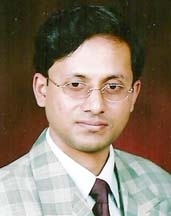
Dr Mohammad Didare Alam Muhsin :
Golden Jubilee of Independence is one of the most emotional moments in the life of a nation. In the life of the Bengali nation, it is for sure. Because 50 years back on this day, this nation jumped into the war of independence with an uncertain future ahead. After a long nine-month war, the Pakistani invaders were finally forced to concede a humiliating defeat. However, this nation had to pay a high price for this — a sea of blood had to be shed and innumerable mothers and sisters had to lose their dignity. Even then, the nation forgot all its sufferings and rejoiced in victory which marked the end of more than 200 years of subjugation that started with the defeat of Nawab Sirajuddaula at the mango grove of Plassey in 1757.
The birth centenary of Bangabandhu Sheikh Mujibur Rahman, the architect of the independence of this country, just a year ago, had added a new dimension to the nation’s excitement in celebrating the golden jubilee of the Independence. But with the ongoing pain due to corona pandemic, the bitter controversy over the participation of the Prime Minister of India Narendra Modi in the Golden Jubilee celebrations began to poison the mood of joy.
One of the highlights of the Golden Jubilee celebrations was the participation of world leaders, especially the Heads of State / Government of the neighboring South Asian countries. Many of them have glorified the event by physically participating in the event. While others have not been able to do so, they sent messages praising Bangladesh’s progress over the past 50 years and wishing it further progress and prosperity. Given India’s great support and active participation in the War of Independence, it was expected that India’s participation in the event would be of special importance. Despite Bangladesh’s tense relations with India on various issues after independence, India is our born friend and closest neighbor. Naturally, they claim this importance. There was no room for disagreement. However, because of Indian Prime Minister Narendra Modi’s extremist sectarianism, anti-Muslim sentiments and seemingly anti-Bangladesh stance in the form of recently proposed NRC, his participation in historically important national events like the Golden Jubilee of Independence drew strong objections from various quarters.
A group of people took out an anti-Modi procession from Baitul Mukarram. Law enforcement agencies tried to control it and apparently some political activists also took a stand against them along with the law enforcement agencies. Massive shelling took place at the point. In this age of Facebook and Internet, obviously it did not take long for this news to spread across the country. In some places, especially in Hathazari and Brahmanbaria, protest marches turned into bloody clashes. As a result, many young lives have been lost prematurely in the last few days. Many resources have been reduced to rubble. A program, that supposed to have been a portrait of the indescribable joy of the people of this country, had to witness blood-stained highways. Worryingly, in some cases, people of high rank and position have been alleged of taking part in direct clashes. Without going into the debate as to who were responsible for these unfortunate incidents, it can be said that the people of this country will be happy if they can erase these days from their memory when they will deal with history in future.
The country became independent by crossing a sea of blood. As a peace-loving people’s leader, Bangabandhu tried to avoid bloodshed till March 25, 1971. When he returned to the country after the independence with his skyrocketing popularity, he devoted himself to trying to unite the country forgetting all kinds of differences. I often wonder why he generously forgave many of active opponents of independence. The only answer I found is: he thought, it was time to unite the nation, not a time of division. When Bangabandhu’s daughter formed the government for the first time in the 90s, she also called for the formation of a consensus government. To me her call of that day seemed to follow the path shown by Bangabandhu.
The big question that has to be raised today is: will the country continue to languish in the quicksand of disunity, strife and confusion? Animosity gives birth to animosity. Bloodshed creates a platform for further bloodshed. Bangabandhu Sheikh Mujibur Rahman and freedom fighter Ziaur Rahman, the key figures of the two main parties of the country, lost their lives to the bullets of the assassin. Therefore, there is no reason to think that Prime Minister Sheikh Hasina or former Prime Minister Khaleda Zia understands the pain of losing a loved one less than anyone else. However, the way in which lives have been lost, one after another, due to bullet wounds in the last few days, it may seem that the cheapest thing now in this country is human life. Please keep in mind that that those who are killing and those who are dying are all children of this soil. Worryingly, even after so much bloodshed, some selfish quarters want to incite more hatred. Now is the time to ponder whose purpose they want to serve by constantly dividing the nation in different names. The self-seeking, grabby, ambitious people from home and abroad who want to plunder the country will never want to see the people of this country united. Now, we have to decide whether we will step into their trap and destroy the country or try to unite the country and the nation by reducing the divisions among ourselves. Time is running out fast. Delay in making a decision can plunge the nation into such a crisis from which it will be difficult to find a way out.
(Dr Muhsin is Professor of Pharmacy, Jahangirnagar University).

